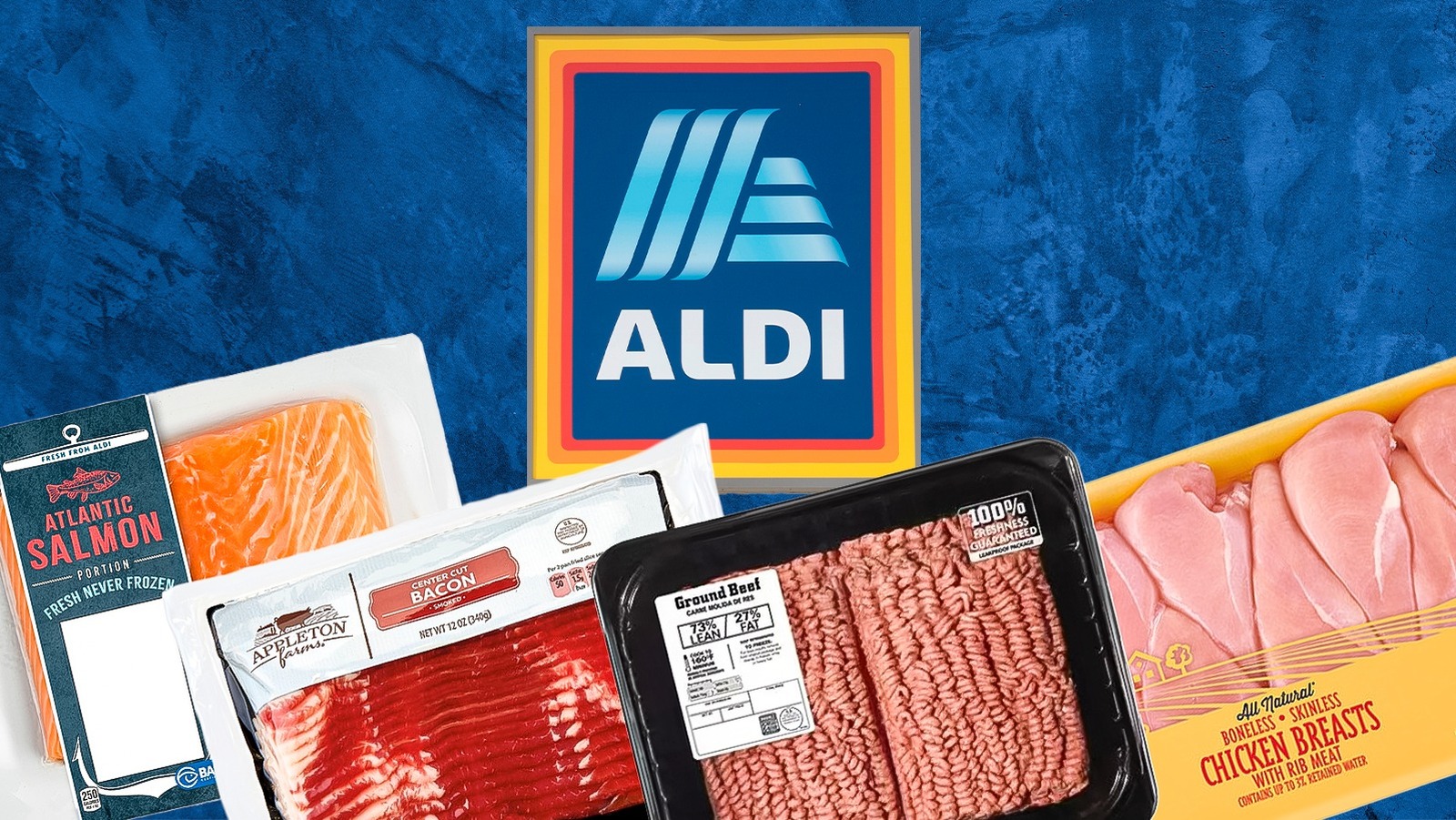Whether you’re a long-time Aldi shopper or a newbie, it’s high time you learned the truth about Aldi meats and unlearned the myths. Some of the myths going around about Aldi meats have been big enough for Snopes to seek out answers to dispel them. Meanwhile, others are rumors whispered around the web or just ones that come from false assumptions.
There are a lot of false ideas about Aldi meat that come from the fact that it’s cheap and has occasionally had a bad reputation in the past. Despite any rumors you may have heard, the chain guarantees its meat quality. Some of the other false assumptions you might have may relate to dietary concerns, sales, best-by dates, or meat safety. After you learn which Aldi meat myths you need to unlearn, we think you’re going to come out with a new appreciation for what Aldi has to offer in its meat department.
That Aldi once intentionally sold horse meat
Okay, let’s get the horse meat myth out of the way first. If you heard that Aldi once sold horse meat, the rumor is absolutely true. However, what’s not true is the fact that Aldi once sold horse meat intentionally. Once the chain realized what had happened, it immediately pulled the horse meat off the shelves in one of its huge recalls.
This horsemeat mixup happened in 2013 in Europe. So, it’s never something that even affected Aldis in the U.S. There were a couple of beef products on the shelves that turned out to contain horse meat instead of ground beef: some frozen burgers and beef lasagna. Basically, there was a mixup in an international meat supply chain. It started out with a French food producer asking its Luxembourgian subsidiary to make the products. Then, the request circled from Luxembourg to another French company, a subcontractor in Cyprus, and to a trader in the Netherlands, who finally ordered the meat from Romania. It was in Romania where the order went terribly wrong, as they misunderstood the request and sent horse meat to make the lasagna and frozen burgers instead of beef.
According to The Guardian, when the mistake happened, Aldi did DNA testing, which revealed that 30% to 100% of these products contained horse meat. Aldi didn’t request horse meat for its beef products, so the horse meat sales weren’t intentional.
That its bacon is lab grown
Another huge rumor that started circulating about Aldi in 2024 was that it sells lab-grown bacon. However you feel about the idea of lab-grown bacon, the truth is that Aldi never sold any. The rumor started because the brand name of its bacon was similar to the brand name of a company that makes lab-grown meat.
Aldi’s store brand of bacon was and still is Appleton Farms. However, the rumor got started because there’s a totally separate company in Canada called Appleton Meats that does make lab-grown meat. The rumor came from an Instagram post that mistakenly connected the two companies to make the claim that Aldi bacon was lab-grown rather than coming from a pig. Instagram eventually labeled the post as being false. We can see how it would be easy to get the names Appleton Farms and Appleton Meats mixed up, but they’re completely unrelated.
Furthermore, Appleton Meats wasn’t even working on lab-cultivated pork products at all. In fact, as of 2025, it doesn’t appear that Appleton Meats’ website even works anymore. So, put any worries you have to rest on there being some conspiracy for Aldi to sell you lab-grown bacon.
You should be concerned about Aldi’s longer best-by dates
A few customers have noticed Aldi having longer sell-by dates than some other grocery stores and have been concerned about the reason behind those longer-than-usual dates. It might seem like it’s too good to be true or that perhaps there are some unwanted chemicals in the meat, making them last longer. However, the truth is that the method Aldi uses to make its meat last longer is quite safe.
In 2020, Aldi purchased Fuji Alpha 8 Flowwrapper machines, which allowed it to package its meats using modified atmosphere packaging (MAP). The way that MAP works is that it creates a different type of atmosphere inside the package than normal. The process and packaging ensures that the right mix of gasses are inside the package. Balancing the oxygen, carbon dioxide, and nitrogen content in the package keeps the meat fresher longer. A decrease in oxygen slows down oxidation, and replacing that oxygen with nitrogen decreases the moisture content in the package. Another bonus of MAP is that it prevents companies from using preservatives. So, you’re getting a meat product that’s less likely to have unwanted meat additives. So, really, those longer best-by dates on the meat are a good thing all around, not a point of concern.
Aldi meat with inflated packaging is unsafe to eat
Some customers have noticed meat with expanded packaging and have been worried that the meat isn’t safe to eat. This worry is a fair one to make since botulism causes bloated packaging when the bacteria growing inside it start producing carbon dioxide. So, botulism certainly could cause meat packaging to balloon. However, the more likely reason that an Aldi meat package looks inflated is because of the modified atmosphere packaging (MAP) that Aldi has started to use, not because of botulism.
Part of the MAP packaging process includes adding gases to control the internal atmosphere of the meat package. As you can imagine, adding air to the packaging can cause the surrounding plastic to swell out a bit. So, the plastic is not going to necessarily be flush against the meat as you’re used to seeing.
It is possible for botulism to affect products that use MAP, but it’s not a huge worry. Since MAP isn’t a thermal process, it wouldn’t destroy any botulism spores present, but removing all or most of the oxygen from the package certainly would help prevent it from growing if it were present. It’s not a bad idea to err on the side of caution, but inflated meat packaging isn’t necessarily a cause for concern. Granted, while not all pathogens produce an odor, if you open a swollen package and you smell spoiled meat or the packaging is damaged, definitely throw it out.
The meat all must be bad because it’s cheaper than at other places
It’s understandable to be suspicious of cheap meat, but there’s no reason to worry that the prices of Aldi’s meat means that you’re getting sub-standard quality. While we tended to skip Aldi meat and produce years ago, the quality has changed for the better, with customers on social media now overwhelmingly reporting positive experiences. In fact, it’s ranked sixth for meat among 20 popular chain stores.
The cheap meat prices are because Aldi generally gets its meat from the nearby region and doesn’t have to spend as much to transport it from elsewhere. Plus, many of the Aldi brands are re-labeled nationally known brands, like Tyson. No, there’s not a butcher on site, but the MAP packaging process we’ve mentioned keeps everything plenty fresh. Even if you’re looking for a good steak, there are tons of people on social media who swear by well-priced Aldi steaks. Granted, like any other steak, looking for good marbling is key.
Of course, just like anywhere else, there are some meats to buy and some to avoid at Aldi. We also want to mention that some people have experienced bad meat at Aldi, but that could happen anywhere. Those who have gotten the rare package of spoiled meat have taken it back, using Aldi’s Twice as Nice Guarantee, which allows them to not only get their money refunded but also get a replacement package of meat that’s not spoiled.
Aldi salmon has always been sustainably raised
Yes, once upon a time, you might have seen Aldi salmon packaging claiming that it was sustainable. However, there were two lawsuits in the early 2020s complaining that the “Simple. Sustainable. Seafood.” label wasn’t exactly honest and misled customers with what they believed about Aldi Salmon, especially since they had a Best Aquaculture Practices (BAP) label.
The two lawsuits addressed two different sources of Aldi’s salmon. GMO/Toxin Free USA’s lawsuit addressed the fact that Aldi was getting some of its salmon from ecologically unsustainable and crowded Chilean salmon farms, while Jessica Rawson’s lawsuit questioned how sustainable Aldi’s Atlantic salmon were being farmed.
While Aldi never admitted that its salmon marketing was misleading, and there was never a court ruling as such, mediation with the companies has led to some changes in the way Aldi labels, markets, and sources its salmon. One change is that it’s now getting some of its Atlantic salmon from facilities with certifications from one of two groups: the Global Animal Partnership or the Aquaculture Stewardship Council. This change, combined with continuing to use suppliers who abide by BAP standards, should give customers more confidence in the quality of Aldi’s salmon.
The red blood in the meat is food dye
Many of us have heard the rumors that butchers use red food dye to make the blood in meat more realistic, and Aldi isn’t immune to these rumors. Some customers, thinking the bright coloring of Aldi beef products was too red to be natural, have taken to social media to ask whether or not they should be concerned. However, the coloring of Aldi’s brand of meats is completely natural.
In 2015, Aldi made a major change to anything that has an Aldi label on it in its store. From that point forward, the chain promised customers to use only natural coloring in any of its store-brand products. So, there’s certainly no red food dye in Aldi’s store-brand meat. While Aldi does allow plant-based red colorings like beet juice and paprika, those ingredients would show up on the label. So, if you’re buying Aldi brand meat, there’s no reason to worry about synthetic red food dye. However, you can always read the label if you’re concerned.
That all its chicken is tough
It’s time we address the type of chicken we all hate: inedible, woody chicken. If you’ve gotten tough chicken from Aldi, it could certainly make you swear off all Aldi chicken. However, you should know that Aldi isn’t the only place that has sold woody chicken. We’ve gotten woody chicken from various grocery stores and from various brands. Yes, it’s disappointingly inedible, but we urge you to try again. Not all the chicken at Aldi is woody and tough. It’s just one of those flukes that happens sometimes.
There has been enough woody chicken going around all over that the chicken industry has studied it to try to figure out what causes it since it was first reported in 2011. There are various causes being studied, ranging from environmental and dietary reasons to vaccinations, genetics, and other possible causes. Those who have studied it have noted that it shows up far more often in breasts from larger chickens. So, you’re probably better off choosing non-breast chicken meat like thighs or smaller breasts.
We don’t find lots of woody chicken at Aldi. As the problem has become more well-known, workers in chicken plants have become better at detecting it and preventing such meat from being sold in the first place. However, if you do end up with some, you can rest assured that it’s safe to eat. If you’d prefer not to, you can always return it to the store for a refund and replacement.
All chicken and turkey sausages at Aldi are safe if you have alpha-gal syndrome
If you have alpha-gal syndrome, accidentally ingesting mammal-derived products can cause an allergic reaction, which is why we wanted to mention that not all chicken and turkey sausages at Aldi are safe to eat. The problem comes with the usage of beef collagen casings for keeping the sausages in their traditional sausage shape. Yes, this is a problem with a lot of chicken and turkey sausages, but some of the ones you’ll find at Aldi are safe, while others are not.
Aldi customers with alpha-gal syndrome have reported on social media their failures and successes when it comes to looking for poultry sausages without mammal-derived ingredients. Customers have mentioned sometimes finding regular poultry sausages and breakfast sausages without beef casings. One brand that customers have found to be safe is Smithfield. However, you can’t go by brand alone. For example, one customer said that Parkview Turkey Polska Kielbasa sausages used beef casings. Meanwhile, Parkview Uncured Turkey Franks wasn’t problematic for them. So, be sure to read the labels to look for mammal-derived ingredients and use an app like Spoonful to help you know whether a particular product is safe or not. The good news is that some of Aldi’s sausages are safe for those who have unfortunately contracted alpha-gal syndrome from pesky little ticks.
Aldi doesn’t have any halal meat
If you’ve been avoiding the Aldi meat section thinking nothing was halal, we have good news for you. It turns out that there are some meats at Aldi that are labeled halal. You’re probably not going to find them all in one section like some chains offer, which means you may have to do a little searching through the meat department to find one. However, Aldi does stock halal meats.
If in doubt about a product, do some label reading to make sure it’s made according to your dietary specifications. Luckily, the halal label is pretty easy to find. For example, the lamb and beef from the Never Any brand has a halal label displayed prominently in the top right-hand corner or bottom left-hand corner of the package if it’s halal. Other brands like Thomas Farms require you to flip it on the back to find the halal label. Customers have even found processed meat products like Journey to India Butter Chicken to be halal. So, label reading is your friend.
You have to look for red sales stickers to find good meat deals
One final myth you need to unlearn about Aldi meats is that only red sales stickers indicate markdowns. However, it turns out that there are times when sales exist without red stickers.
Sometimes, rather than putting stickers on all the sales meats, an employee will simply make a sign concerning the sales prices of particular meats in a certain area. There should be a 50% discount on items with a sell-by date coming up the next day. However, sometimes, employees fail to put sales tags on them.
So, when can you find other sales deals like $1 or $2 off? It really varies by location. In some stores, customers seem to find them more often starting on Sunday nights. Whereas, in other stores, the meat sales hit the morning when new items hit the shelves (usually Wednesdays). Although, you might find them any time a product is about to reach its sell-by date since the store wants to get it off the shelf by that date. Customers on social media have reported often finding unstickered items within a day or two of the sell-by date that ring up with sales prices. So, always look for sell-by dates if you don’t see any red stickers. Customers have also mentioned asking the cashier to apply the discount if it doesn’t show up automatically at checkout on items within a day or two of the sell-by date.





